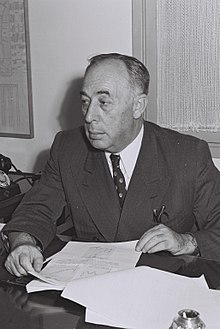Israel Rokach
| Israel Rokach | |
|---|---|
 |
|
| Date of birth | 31 December 1886 |
| Place of birth | Jaffa, Ottoman Empire |
| Date of death | 13 September 1959 (aged 72) |
| Place of death | Israel |
| Knessets | 1, 2, 3 |
| Faction represented in Knesset | |
| 1949–1959 | General Zionists |
| Ministerial roles | |
| 1952–1955 | Minister of Internal Affairs |
Israel Rokach, Honorary CBE (Hebrew: ישראל רוקח; December 31, 1886 – September 13, 1959) was an Israeli politician, Knesset member, and second mayor of Tel Aviv from November 15, 1936 to April 13, 1953.
Israel Rokach was born in 1886 in Neve Tzedek, then part of Jaffa. His mother is Rachel Rokach (born in 1863). His father, Shimon Rokach (born in 1863), a journalist, was one of the founders of the neighborhood. His grandfather, Israel Beck, revived the Hebrew printing industry in Palestine. Rokach attended a cheder and then an Alliance Israélite Universelle school. He traveled to Switzerland, where he continued his education at a high school in Lausanne and then studied electrical engineering at the Zürich polytechnic.
In 1920 Israel Rokach moved to the United Kingdom, where he worked as an electrical engineer. In 1922 he returned to Jaffa, where he opened a store for electrical supplies. In 1933, Rokach married Esther Epstein. Israel Rokach was the brother of Hannah Majaro, Miriam Katz, Yoseph Rokach and Itzhak Rokach. He was the father of Livia Rokach and Iry Ricci. Iry's name (Hebrew: עירי) means 'my city', an example of his great love for Tel Aviv.
Rokach died in 1959 and was buried in Trumpeldor Cemetery in Tel Aviv.
Rokach's first public position was council member in Jaffa, representing the Jewish neighborhoods of Neve Tzedek, Neve Shalom and Ohel Moshe. In 1922, he was elected to the city council of Tel Aviv, representing the United Centrist List party. In 1929 he was appointed deputy mayor to Meir Dizengoff.
In the 1936 municipal elections, Israel Rokach represented the right-wing parties, although he lost to Moshe Chelouche of the workers' parties. Nevertheless, the British High Commissioner forced Rokach's appointment to the mayoral post. Despite public uproar about British intervention in the Jewish democratic process, Rokach went on to serve as mayor of Tel Aviv until 1953. For his great success, he was awarded the title of Officer of the Order of the British Empire.
...
Wikipedia
